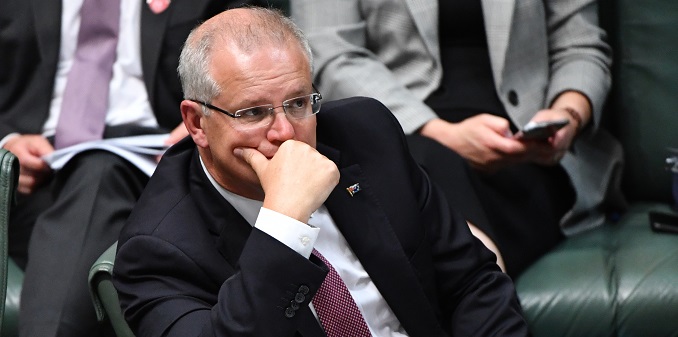
Prime Minister Scott Morrison. Source: AAP Image/Mick Tsikas.
Facing a possible revolt from Nationals MPs, the government has agreed to support reforms which will improve access to justice for small businesses.
Amendments which will allow small businesses to apply to avoid paying legal costs in public interest competition cases against large firms passed the Senate last Thursday with support from Labor and the crossbench, despite being opposed by the government.
It set up a political booby trap for Prime Minister Scott Morrison heading into this week, with Labor intent on using the otherwise uncontroversial changes to test the government’s hold on power in the lower house.
Last week the coalition lost a vote in the House of Representatives on medical evacuations for asylum seekers, the first time in 90-years a sitting government has lost a lower house vote.
Facing a repeat after several Nationals backbenchers, including Barnaby Joyce, publicly signalled their support for the changes, the government has confirmed a back down on the reforms.
The changes have the backing of both the Australian Small and Family Enterprise Ombudsman (ASBFEO) and the Council of Small Businesses of Australia (COSBOA).
They amend the Competition and Consumer Act to enable small businesses to apply for a no adverse cost order if pursuing a large firm through the courts for anti-competitive behaviour.
Intended to help with high profile competition cases between small suppliers and large firms, if a court agrees a case is in the public interest, small businesses won’t be forced to pay the other side’s legal costs if they lose.
ASBFEO is also able to help small businesses prepare arguments under the reforms.
While the changes are now slated to pass parliament, small businesses faced becoming a political football last week as Labor prepared to use the broadly supported changes to pressure the government.
Access to justice has formed up as a serious issue being researched by ASBFEO more broadly.
Initial findings from an ongoing investigation into access to justice for small business has found one in five (22%) have experienced a dispute in the last five years.
The overwhelming majority (87%), of the 1,600 business owners surveyed by ASBFEO so far say they suffered a financial loss as a result of pursuing legal action.
Labor moves to wind back double-dipping regulation
Meanwhile, employer groups are urging Labor to back down on plans to disallow government regulation designed to address casual workers double dipping on entitlements.
Last Thursday Labor Senator Doug Cameron moved a motion to overturn the regulation, brought in by Industrial Relations Minister Kelly O’Dwyer last December.
The government recommended the Governor-General create a Fair Work regulation protecting against casuals claiming they’re owed to casual loadings as well as other entitlements like annual leave.
The so-called “double-dipping” issue arose after a Federal Court ruling last year, which opened the door to casuals working regular shifts over extended periods making back-payment claims for leave entitlements.
Under the government regulation casual loading payments can be offset against any back-pay claims, however, it is up to the courts to make a determination on the offset.
The government has still yet to commit to clarifying the definition of casual work in the Fair Work Act, which employer groups, including COSBOA and the Australian Industry Group, have pushed for.
Workplace lawyer Peter Vitale warned last December that the Senate may disallow the regulation, but the government has few options as it would likely be unsuccessful in passing its own Fair Work Act changes through the Senate.
Shadow industrial relations minister Brendan O’Connor has criticised the regulation, saying a lack of legislative change makes it meaningless.
“This is bad regulation that the government’s own advice argues doesn’t even change the existing law. How can you get a remedy if you don’t change anything?” He said in a statement.
“The government has shown no interest in tackling precarious employment and therefore are unlikely to join Labor and legislate an objective definition of ‘casual’.”
According to Ai Group estimates there are $5.7 to $8 billion in possible back-payments on the line for employers across the country.
Small businesses are included in that cohort, however, the bulk of attention by class action firms thus far has been on large labour hire businesses like Hays and Workpac.
Casuals need to be employed in specific circumstances to have any prospect with a back-payment claim, including working regular shifts over an extended period of time.
This story was updated at 12:20 PM February 18.
NOW READ: Government moves on “double-dipping” casual workers — but changes far from bulletproof
NOW READ: Fear for SMEs as employers could be up for $8 billion in leave payments to casual workers


COMMENTS
SmartCompany is committed to hosting lively discussions. Help us keep the conversation useful, interesting and welcoming. We aim to publish comments quickly in the interest of promoting robust conversation, but we’re a small team and we deploy filters to protect against legal risk. Occasionally your comment may be held up while it is being reviewed, but we’re working as fast as we can to keep the conversation rolling.
The SmartCompany comment section is members-only content. Please subscribe to leave a comment.
The SmartCompany comment section is members-only content. Please login to leave a comment.